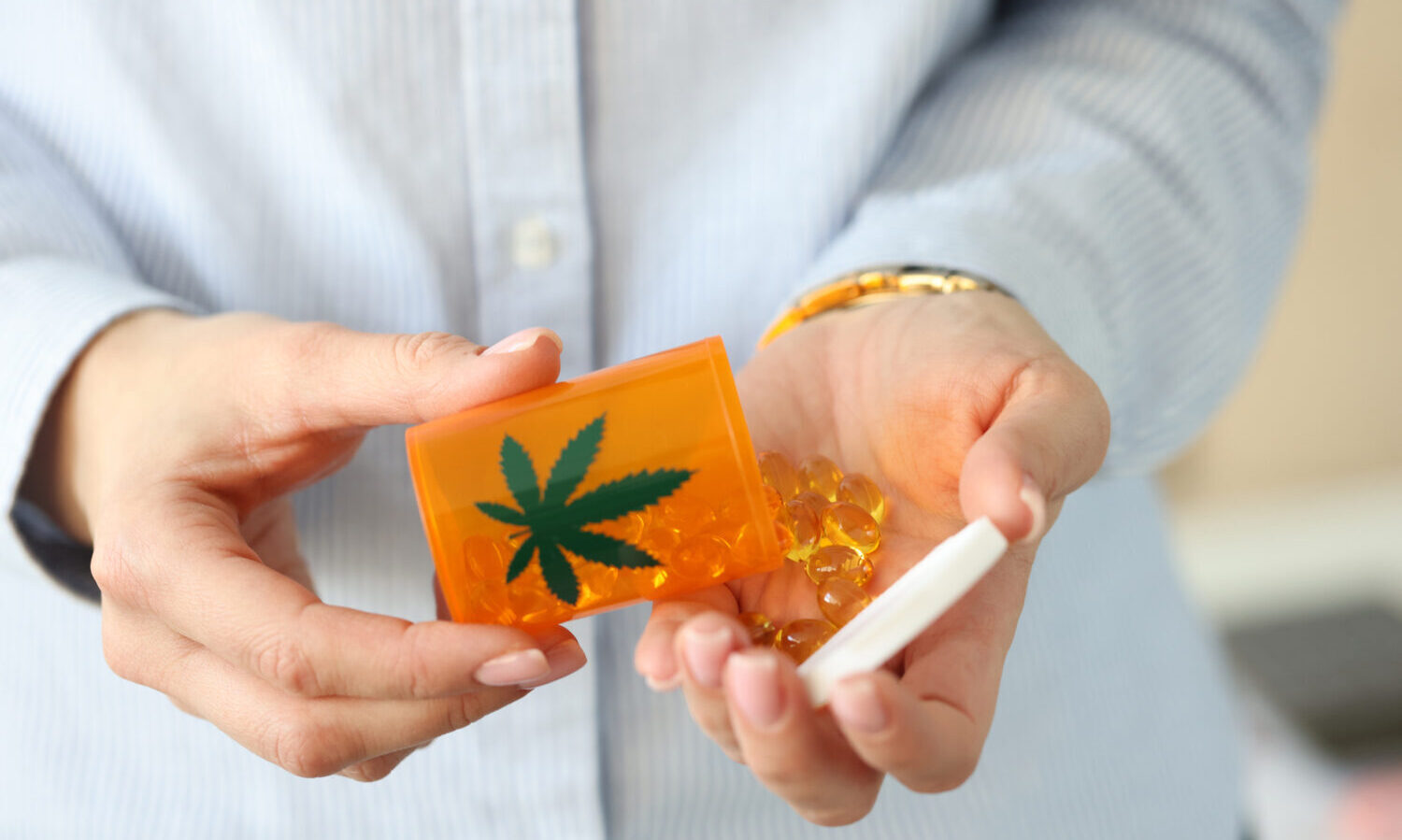THC tablets and capsules are an excellent alternative to smoking. They do not burn the throat and do not cause coughing. THC pills act like edibles, providing the same potent high. But what is the advantage of THC and CBD tablets?
Weed pills are a product that is easy to dose. Capsules differ from each other in the number of cannabinoids they contain. Today’s cannabis industry can provide the customer with more than just THC and CBD to choose from. It is an opportunity to try different cannabinoids and choose the one that suits you best.
The principle action of THC tablets and capsules is quite simple. Once the product enters your digestive system, the capsule shell breaks down. Cannabinoids enter the body through the blood and then metabolize in the liver.
Since the process takes time, do not rush to take many pills at once. It is usually worth waiting about an hour (sometimes 90 minutes) for the capsules to take effect. It all depends on the characteristics of your body (for example, your age, your metabolism, whether you are taking other pills, etc.).
Types of Capsules
Capsule types are constantly being improved upon, so there are a lot of them. Sometimes reading more information about a product can be confusing.
.jpg)
Ground Buds
Crushed cannabis flowers can be consumed in capsules if they have undergone a decarboxylation process. The cannabis must be exposed to heat, where the cannabis acids CBDA and THCA become the familiar THC and CBD. Without carboxylation, it makes no sense to use marijuana in capsules because it is not activated.
Distillate
THC distillate is a thick and viscous liquid, somewhat reminiscent of honey in consistence. The distillate is necessarily 80-90% single cannabinoid, often either THC or CBD. You can be sure of the quality of the distillate: when you buy THC oil capsules, you will get 85% or more THC content.
Crystalline
THC capsules may contain crystalline, which is a substance such as salt or sugar. These are pure powdered cannabinoids. You can find different types of crystalline pills, but often the tablets contain only THCA or CBDA, non-activated cannabinoid acids. Thus, patients can consume the weed safely.
CBD to THC Ratio
To achieve a certain effect, the manufacturer can manipulate the components. Thus, 1:1 or 3:1 capsules are popular in the cannabis market.
Broadspectrum
Broad-spectrum capsules are mostly CBD products. This type contains CBD and other components of the cannabis plant except for THC. These tablets contain almost all the molecules of the original plant.
Full Spectrum
Full spectrum products include all terpenes and cannabinoids from the source plant. This type is like a broad-spectrum and contains a small amount of THC. Typically, full spectrum capsules are ground decarboxylated weed or an oil base.
How to Make Cannabis Capsules
Although buying ready-made products is much easier and safer, you can try making cannabis capsules yourself! If you have already prepared cannabis edibles, you will not have any problems with the task at all.
- Grind the weed and spread it on a baking sheet lined with baking paper. It is important to properly spread the cannabis over the entire surface, so it heats up evenly;
- Preheat the oven to 200 degrees Fahrenheit before placing the baking sheet in the oven;
- Warm up marijuana for 30 minutes;
- Add the cannabis to a pot of simmering oil (choose coconut or olive oil);
- Boil for about an hour;
- Cool the mixture;
- Using a pipette, fill the gelatin shells with a homemade mixture.
Alternatively, you can just buy casings and weed oil tinctures.
Read Also: Medical Marijuana — What You Should Know
Why Choose THC Capsules?
.jpg)
Why do marijuana fans love THC capsules? Here are some of the most popular reasons:
Great Effects
THC capsules do not start working immediately. The expectation is worth it since the effect of the pills and edibles is more potent than that of smoking. The average duration of a buzz is from 5 to 10 hours. You can read more about edibles here.
Dosage
An accurate grammage of each capsule allows you to calculate the correct dose. Smoking is always random because you can’t control how much you end up inhaling. Besides, medical patients should always know their dosage. In order not to guess, you can use THC and CBD capsules.
Convenience
Most marijuana users would like to be able to avoid drawing so much attention to themselves. The smell of weed alone will keep you from smoking your joint unnoticed. But taking medical marijuanas pills will not created any extra attention.
Health
Many users do not want to smoke for personal reasons. After all, weed has strong smell. It is a harsh smoke that harms the lungs and impairs breathing. It is understandable why many people switch to THC oil capsules. This is a much healthier alternative.
Potential Side Effects
Despite these advantages over smoking, THC capsules also have their drawbacks. People don’t see pills as a “potent weed”, and they can go over the top with dosage. The immediate side effects will leave you feeling anxious, panicky, and paranoid. But it is also important to consider the long-term use of capsules. If you experience the following symptoms even when you are not high, then you are most likely experiencing marijuana side effects:
- Loss of appetite
- Mood changes
- Chills
- Depression
- Stomach problems
- High blood pressure
- Weight loss
- Irritability
- Sleep problems
- Headache
- Difficulties with focusing
- Sweating.
However, if you choose CBD capsules, you will save yourself from such side effects. Moreover, CBD is non-psychoactive, and its effects are slow to appear. The effects of CBD are cumulative, like vitamins.
Read Also: What Is THC Or Tetrahydrocannabinol?
Medical Properties of THC Pills
Despite the strong mental impact, THC capsules are also used in medicine. These effects have a positive effect on the central nervous system. For the most part, THC pills for pain reduce or eliminate the pain of different types and muscle spasms. On the other hand, constant weed consumption will greatly affect your perception of the world.
.jpg)
Moreover, patients reported the following positive cannabis capsules effects:
- Mood improvement
- Reduced social anxiety
- Pain relief
- Treatment of nausea and vomiting
- Increased appetite
- Relaxation
- Sleep stabilization.
How to Consume THC Caps
THC capsules can be taken with water. If you are a beginner, then it is worth starting with low doses, about 5-10 milligrams. You can speed up the effectiveness of the capsules if you take them on an empty stomach. Food can slow down the absorption of weed tablets.
Give yourself about an hour to appreciate the power of the effects. Capsules take time, and it is important not to take too many capsules at once. It can lead to negative effects.
Conclusion
You can consider THC capsules as a good alternative to smoking weed. Still, before you decide on the consumption method, it is worth considering all the risks and disadvantages.
This article originally appeared on AskGrowers.com and has been reposted with permission.


 Cannabis News1 year ago
Cannabis News1 year ago
 One-Hit Wonders1 year ago
One-Hit Wonders1 year ago
 Cannabis 1011 year ago
Cannabis 1011 year ago
 drug testing7 months ago
drug testing7 months ago
 Marijuana Business Daily1 year ago
Marijuana Business Daily1 year ago
 Education1 year ago
Education1 year ago
 Cannabis1 year ago
Cannabis1 year ago
 Education1 year ago
Education1 year ago


.jpg)
.jpg)
.jpg)
























